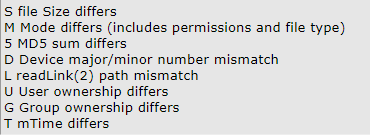Table of Contents
- Integrity of the system need to be protected at all costs. For this, system administrator need to do periodic checks in the machine/system.
- Term Integrity of the system is a cumulative broad topic, where the whole integrity of the machine can be determined by individual level checks done on different sections areas (files, authentication, authorization, auditing, network)
- One of such checks, is the integrity of the files delivered by the rpm. Integrity of files means, no modification should be allowed to happen/occur to the files in any form, after the files is placed in the machine by the rpm
RPM Verify Error : What it means?
- Integrity of the files delivered by a rpm , can be done using rpm -V <installed-rpm-name>
- If there is no impact to the integrity, output of the rpm -V will be empty for that rpm
[root@n-server pam.d]# rpm -V linux-data-hub-01-2022.noarch SM5..UGT. /opt/pam/basic_pam.c missing /opt/pam/simple_pam.c
- In the above command snippet, when verification is done, it can be seen that we got some output, and below snippet shows how to infer the output
- We can infer that our file "/opt/pam/basic_pam.c", Size, Mode, MD5, User, Group, Time got changed
- File /opt/pam/simple_pam.c is missing
- Hence the integrity of the rpm linux-data-hub-01-2022.noarch, is lost
Warning: It is not ideal/recommended to suppress the error for file integrity. In Production environment, proper investigation should be done to find why the files got modified .
How to Suppress the Error ?
- In some cases, it is imperative that the mode or permission of content of the file will get changed. And those files can be considered as config
- In other cases, we can do partial verification. We can mention in the rpm spec not to verify some checks on the file delivered by rpm
RPM Spec under discussion
- I'm reusing the rpm spec used in another article, which can be seen here
Test Script for Error Simulation
- Im Using below test script which will apply the required changes to simulate the error scenario and will do the checks
rpmbuild --ba /root/***/Linux/rpm/rpm_verify_error_suppress.spec rpm -Uvh /root/rpmbuild/RPMS/noarch/linux-data-hub-01-2022.noarch.rpm --force #To simulate "missing" error rm -rf /opt/pam/simple_pam.c #To simulate User, Group modification chown abhi:abhi /opt/pam/basic_pam.c #To simulate Md5, Size, time modification echo "test" >> /opt/pam/basic_pam.c #To simulate mode modification chmod 777 /opt/pam/basic_pam.c #To simulate Group modification chown abhi /opt/Readme.md rpm -V linux-data-hub-01-2022.noarch
- In the above script,
- Im building rpm and installing the rpm
- A file (/opt/pam/simple_pam.c) delivered by the rpm is removed to simulate the "missing" error
- The ownership (user and group) and mode of file /opt/pam/basic_pam.c is changed
- Dummy content is appended to file /opt/pam/basic_pam.c to simulate md5 ,size and time modification
- The user ownership of /opt/Readme.md is changed
- rpm integrity check is done
Once rpm integrity is done with the below changes, errors can be seen, which is matching to modification done by our test script
[root@n-server rpm]# rpm -V linux-data-hub-01-2022.noarch .....U... /opt/Readme.md SM5..UGT. /opt/pam/basic_pam.c missing /opt/pam/simple_pam.c
Modification to be done in SPEC to suppress this error
- In the files macro, we can use some inbuilt rpm macro to suppress this error by controlling the checks.
- Below snippet shows the changes done to the existing spec file under macro %files and the explanation for each change
%files %defattr(500,root,root,-) # Verify only whether group of the file is changed %attr(500,root,root) %verify(group) /opt/Readme.md # Dont Verify size, user, group, mode, md5, time %attr(500,root,root) %verify(not size user group mode md5 mtime) /opt/pam/basic_pam.c # Marked the file as config and gave missing ok macro, so that even if the file is removed, it will not show as missing %config(missingok)%attr(500,root,root) /opt/pam/simple_pam.c
Verification of the new SPEC
- Same test script is re-executed to create rpm with new spec changes, and do to same modification to the files which we have done earlier
- Upon verifying the integrity, it can be seen that, there is no output (no error), eventhough the files are modified and deleted
[root@n-server rpm]# rpm -V linux-data-hub-01-2022.noarch [root@n-server rpm]#

